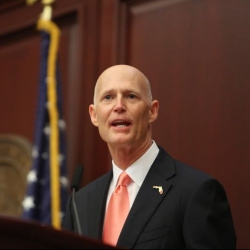
Gov. Rick Scott negotiated a compact with the Seminoles in December 2015, but the legislature still needs to approve it.
The deal Gov. Rick Scott signed with the Seminole Tribe of Florida in December has a wrinkle. Despite signing a deal that assures they pay $3 billion to the State of Florida over the first 7 years of a 20-year deal, the Seminoles continues to sue the state. As long as that lawsuit is ongoing, the chance exists that the Seminoles will not have to pay that $3 billion.
The lawsuit was filed in late-October 2015, as the negotiations reached a critical stage. It was seen as a leveraging tool by the Seminoles, and a powerful one. The Seminoles have a long history of beating the State of Florida in the court system. That was underscored last week, when a US District Court judge denied Florida’s request to dismiss the lawsuit.
The leverage remains in place. If the legislature does not pass the compact into law, then the Seminoles would not have to make payments. Florida could fumble away $3 billion, which is a good incentive to pass the bill. But not everyone is likely to take a big-picture approach to the gaming compact.
Might Not Receive Ratification
The Seminole deal needs approval from the Florida legislature. Gambling bills in the state of Florida have been described as a “Rubik’s Cube“, a “three-dimensional game of Chess“, and a “Sisyphean task“, so passage of the bill is no sure thing. In fact, several Republican lawmakers have gone on record daying the bill either will not pass, or faces a severe uphill climb to passage.
Bill Galvano on the Deal
Senate Majority Leader Bill Galvano, a Republican from Bradenton, knows the Seminole issue well. Galvano negotiated the 2010 gaming compact which expired in October 2015.
He said of the chances of passing the gaming bill, “That’s going to be a challenge this session, bringing all of that together to be able to have the requisite number of votes in each chamber. Then add to that the anxiety of timing, because when these issues open up and close, the entities that are interested don’t know when they’ll have another opportunity.”
Decoupling Leads to Opposition
Certain language in the bill is troubling to many Florida politicians. If the bill became law, it would allow the possibility (without mandating) more slots in Palm Beach County, as well as a new slots facility in Miami-Dade County. The deal would bring the possibility of electronic blackjack to the pari-mutuel venues in Broward and Miami-Dade counties.
Most controversially of all, it would give racetracks the ability to operate slots parlors without having horse racing or dog racing active, in a process called “decoupling“. Decoupling is a controversial issue, because analysts saying it would undermine — perhaps destroy — the horse breeding industry of Florida. It would do the same to the dog racing industry, but lawmakers are less concerned with it, because it is in disrepute at the moment.
Thus, the deal faces opposition from those who oppose any expansion of gambling in Florida. It also faces opposition from those who want to protect the horse training industry. The Seminole compact also faces opposition from lawmakers whose districts did not receive a good deal in Rick Scott’s negotiations.
Working the Rubik’s Cube
Gambling is an issue which fractures the usual political coalitions in Florida. Many Republicans do not want an expansion of gambling, while some are championing Rick Scott’s deal. Democrats tend to be more friendly to the legalized gambling issue, but some have issues with the current deal.
Sen. Oscar Braynon, a Democrat from a Miami Gardens who serves as a member of the Senate Regulated Industries Committee, which has to pass the bill out of committee, said that Democrats in districts who were left out of the deal see little reason to vote “Yes”.
Braynon said that Senate Democrats “are looking very parochially at what’s happening to the facility in my district, or how does it affect it. Right now, I don’t know that the compact does enough to galvanize enough Democrats to get the votes.”
Crisafulli: “A Very Challenging Issue”
House Speaker Steve Crisafulli, who lives in Broward County and understand the opposition there, said that he thinks the votes exist, if the lawmakers get the wording right. He told WUSF News, “Is the clock running? Yes. Is it getting late in the game? Yes. Is it going to be a very challenging issue to pass out of the Legislature? Yes. That’s just the reality of where we are. Can it be done? Certainly.“
